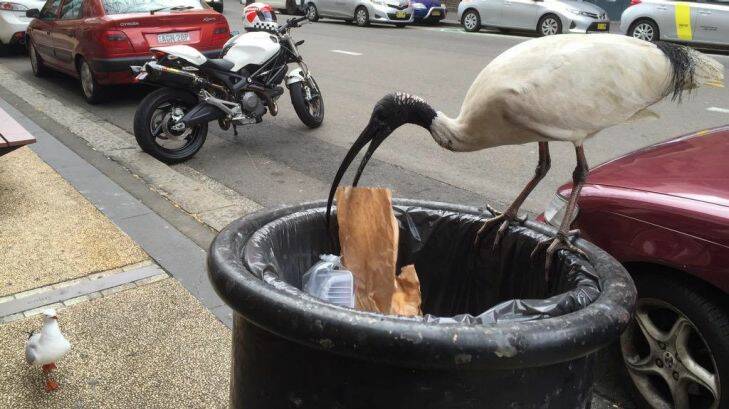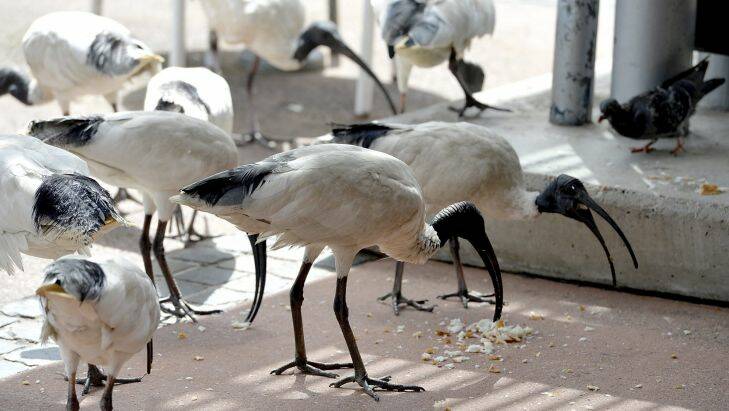

Brisbane's ibis population has dropped more than 30 per cent in the past financial year but it is unclear what has happened to them or whether they will be back.
Subscribe now for unlimited access.
$0/
(min cost $0)
or signup to continue reading
In the 2016-17 financial year, Brisbane City Council recorded the city's ibis population as 3228, a sharp drop from the 4712 recorded the previous year.
Often ridiculed as a "bin chicken", "tip turkey" or "sandwich snatcher", the large water bird was actually well-liked by Brisbane's tourists, according to Griffith University urban ecologist Professor Darryl Jones.
He said some tourists were even taking selfies with the native bird.
Professor Jones said the latest research conducted by students at Griffith University revealed about 70 per cent of thousands of ibis interactions recorded across South Bank, City Botanic Gardens and Roma Street Parkland in the past year were regarded as "enjoyable".
"That has totally astounded us," he said.
"So this big bird that's a water bird that looks very unusual and comes right up to you for lots of people is a really strange and really positive interaction.
"Selfies with ibis is something you've got to say is unexpected."
But while tourists were intrigued by the ibises, Brisbane City Council received 35 complaints a year for the past two years about the bird.
In the 2016-17 financial year, the most gripes were made for Brisbane City, Chermside, Forest Lake, Nudgee, South Brisbane and Wynnum, which all attracted three resident complaints.
A spokesman said the council was aware of and closely monitoring ibis populations at 17 sites in the city.
"Ibis populations generally grow in response to food sources increasing and weather conditions," the spokesman said.
"Council's management of ibis includes reducing potential food sources through additional bins, more frequent collection of rubbish and additional cleansing at picnic areas.
"Council will also discourage people from feeding ibis through signage and patrols."
Brisbane City Council ibis management sites
- Aquarium Passage, Pinkenba
- Hannam Street, Wynnum
- Biambi Yumba Park, Fig Tree Pocket
- Brisbane City Botanic Gardens, Brisbane City
- Forest Lake Parklands, Forest Lake
- Gowan Road Park, Stretton
- Sandy Camp Road, Lytton
- Sherwood Arboretum, Sherwood
- Metroplex, Lytton
- Mt Coot-tha Botanic Gardens, Mt Coot-tha
- Billabong Place Park, Calamvale
- Norman Creek, Coorparoo
- New Farm Park, New Farm
- Towner Street, Sandgate
- Einbunpin Lagoon, Sandgate
- Seventh Brigade Park, Chermside
- Harold Kielly Park, Bald Hills
Professor Jones said the council's approach to managing ibis populations was a "sensible idea" and the population decrease was unlikely to be permanent.
"Rather than concentrating on the place in the city where we might think that's where all the conflict is ... all of those (suburban) places are breeding colonies and they need to know how well they're going," he said.
"There is a breeding colony in the City Botanic Gardens but it's relatively small (compared) to lots of other places.
"The ibis that ultimately ends up in the city could come from any of those places so it's really a sensible idea to keep an eye on all the sources where the ibis might be coming from.
"Usually they're in swampy areas where people don't like to go very much."
But Professor Jones did not believe the council management program was responsible for the sudden decrease in ibises and said there was no logical or obvious reason for it, ruling out disease.
"Nothing really has changed. Well, things have changed in the sense that it was a very dry half of the year but that usually means they are likely to go to places where the water is guaranteed, which are the parks and the lakes and the river and that sort of thing that are in the city, so it's not really what we're expecting," he said.
"The other thing is there is no doubt the population has stopped growing in the city.
"It's just reached maximum capacity. There's not enough food and space for them to reach any more numbers."
Professor Jones said the birds could travel substantial distances in short amounts of time and could come and go from Brisbane all the time.
"I don't think there's any reason to think there are not going to be ibises around in Brisbane," he said.
Ibises are protected under the Queensland Nature Conservation Act 1992 and it is a serious offence to harm the birds.

